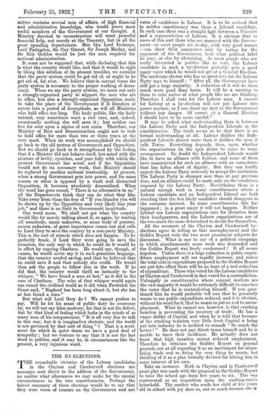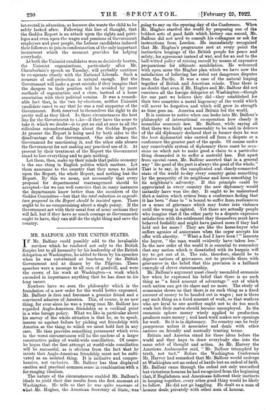• THE BY-ELECTIONS.
THE remarkable victories of the Labour candidates in the Clayton and Camberwell elections are messages sent direct to the address of the Government, no mater what allowances we may make for the special circumstances in the two constituencies. Perhaps the fairest summary of these elections would be to say that they were votes of Censure on the Government and not _ votes of confidence in Labour. It is to be noticed that In neither constituency was there a Liberal candidate. In each case there was a straight fight between a Unionist and a representative of Labour. It is obvious that in cases of this sort those who are annoyed with the Govern- ment—as most people are to-day, with very good reason —can show their annoyance only by voting for the opponent of the Government, bear what political label he may, or else by abstaining. As most people who are really interested in politics like to vote, the Labour candidate in such a by-election probably gets a good many votes which he would not get at a General Election. The moderate elector who has no great love for the Labour Party says to himself : "After all, the Government have still got a large majority. A reduction of it will do them much more good than harm. It will be a warning to them to take notice of what people like me are thinking. Therefore I shall vote for the Labour man. A success for Labour at a by-election will not put Labour into power anyhow, so I can shoot my dart at the Government without any danger. Of course, r.t a General Election I should have to be more careful."
It may be asked what understanding there is between the Labour Party and the Independent Liberals in the constituencies. The truth seems to be that there is no formal understanding at all. Labour dislikes the Inde- pendent Liberals almost more than it dislikes the men it calls Tories. Everything depends, then, upon whether the organizations on the spot desire to come to some arrangement. . No doubt the Independent Liberals would like to have an affiance with Labour, and some of them have manoeuvred for such an affiance with an earnestness that has fallen short of dignity. But they can hardly expect the Labour Party seriously to accept the invitation. The Labour Party is stronger now than at any previous time, and an alliance could be made only on the conditions imposed by the Labour Party. Nevertheless there is a natural enough wish in many constituencies where a Labour candidate and an Independent Liberal are both standing that the less likely candidate should disappear in the common interest. In some constituencies this has happened ; in a great many it will not happen. Neither Liberal nor Labour organizations care for dictation from their headquarters, and the Labour organizations are of the two much the more determined to decide for themselves.
All the accounts of the Clayton and Camberwell by- elections agree in telling us that unemployment and the Geddes Report were the two most prominent subjects for discussion. What is one to say of a political campaign in which simultaneously more work was demanded and the Geddes Report was freely condemned ? It all seems hopeless. Unless there is a huge reduction in public expen- diture employment will not rapidly increase, and unless the total cuts in expenditure proposed in the Geddes Report are put into effect there will be no hope of a real reduction of expenditure. Those who voted for the Labour candidates at Clayton and Camberwell in fact voted for a contradiction. Unhappily in constituencies where manual workers are the vast majority it would be extremely difficult to convince the voter that he is contradicting himself. If you ques- tioned him he would probably tell you that he genuinely wants to see public expenditure reduced, and it is obvious, without his word for it, that he wants -to put an end to unem- ployment. What he cannot see, however, is that crushing taxation is preventing the recovery of trade. He has a vague dislike of Capital, and when he is told that because of the crushing taxation very little fresh Capital is being put into industry he is inclined to remark "So much the better 1" He does not pay direct taxes himself and he is unable to trace their incidence. He actually does not know that high taxation means reduced employment. Therefore he criticises the Geddes Report on general grounds, not at all regarding it as an instrument for stimu- lating trade and so doing the very thing he wants, but thinking of it as a plan brutally devised for hitting him in some interest of his own.
Take an instance. Both in Clayton and in Camberwell great play was made with the proposal in the Geddes Report to raise the school age from five years to six. This was represented as an imposition upon the working-man's household. The mother who Sends her child of five years old to school with joy does so, not so much because she is Interested in °duration; as because she -wants the child to be safely looked after. Following this line of thought, that the Geddes Report is an attack upon the rights sand privi- leges and even-upon the wages and pensions of Government employees and ,poor people, the Labour eandidates induced their followers to joinin condemnation of the only important instrument which the moment -provides for helping everybody.
As both the Unionist candidates were so decisively beaten, the Unionist organizations, particularly after Mr. Chamberlain's speech on Tuesday, will probably continue to co-operate closely with the National Liberals. Such a measure of self-protection is natural enough. But the Government will make a great mistake if they imagine that the dangers to their position will be avoided -by mere methods of organization and a close, instead of a loose association with their: political cousins. It was a remark- able fact that, in the two by-elections, neither Unionist candidate ,cared to say that he was a real supporter of the Government. Both reserved to themselves the right to do pretty well as they liked. In these circumstances the best line for the Government to tJ.ke—if they have the sense to take it, which we doubt—is to put an end at once to all the ridiculous misunderstandings about the Geddes Report. At present the Report is being used by both sides to the disadvantage of the Government. One side abases the Government for sanctioning it, and the other side abuses the Government for not making any practical use of it. At present by their treatment of the Report the Government stand to lose everything and to gain nothing.
Let them, then, make up their minds that public economy is the one thing in English politics 'which matters. Let them announce to the country that they mean to .insist upon the Report, the whole Report, and nothing but the Report. By this we mean, not necessarily that every proposal for departmental rearrangement should -be accepted—for -we can well conceive that in many instances the departments know better than the members of the Geddes Committee—but that the total reduction in expendi- ture proposed in the Report should be insisted upon. There ought to be no compromising about a single penny. If the Government -act with their usual fear of noisy sections. they will fail, but if they have as much courage as -Governments ought to have, they -can till do the right thing and save the country.



































 Previous page
Previous page